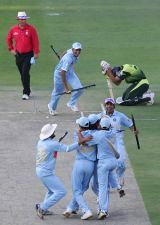India won because they refused to lose
India were fitting winners because they held their nerve whereas Pakistan lost theirs in the moments that mattered
24-Sep-2007
|
|

|
Phew! Are these two teams capable of playing out a match that's a bit kinder on the nerves? Thank goodness they aren't, for they produced the best final in any form of the World Cup in ages. It's difficult not to feel for the Pakistanis because they lost by a mere fraction, but you could say India were fitting winners because they held their nerve whereas Pakistan lost theirs in the moments that mattered.
Or, to be precise, the moment that mattered. Sport can be cruel because it takes only a moment to undo a day's, or in this case, an hour's, good work. Misbah-ul-Haq now has a lifetime to ponder over his shot selection on that fateful ball. Until that point both he and Joginder Sharma, India's least likely bowling hero, had been equals. Sharma, who like Misbah was hardly an automatic selection for the tournament, had bowled three outstanding overs (13 runs for one wicket); Misbah kept Pakistan alive almost single-handed as wickets tumbled around him. When it came to the final over, though, there was room for only one hero.
After a first-ball wide and a third-ball six, the force was with Misbah. But having gone down the ground earlier, he preferred the cute shot - the paddle over fine leg - to the straight thump that had worked well for him so far. As Shoaib Malik, his captain, confessed with an air of resignation, Misbah had gone down the wicket to hit the ball straight, but changed his mind. "I don't know why he did it."
The rest of Chetan Sharma's career was haunted by the memory of a yorker that went wrong - needing three off the last ball, Javed Miandad deposited the full toss over the boundary to win that match in Sharjah. Hopefully Misbah, who made an impressive comeback to the national team, will be mentally stronger, and the fans will be more understanding. Without him, Pakistan were gone long ago.
The only regret, if at all, is that a cracking match was decided by a mistake, and not a burst of brilliance.
But India deserved to win because they simply refused to lose. A total of 157 was 23 runs short of what they aimed at after choosing to bat, and it was three short of what Pakistan wanted to restrict them to. But it wasn't quite the belter that the Wanderers is reputed to roll out, the ball didn't come on to the bat, and even Yuvraj Singh, whose timing has been sensational, was often early on the stroke. It was one such stroke that led to his dismissal.
But as always, pitches that don't blank out bowlers produce good games, and not for the first time in the tournament, India stayed in the contest by taking wickets. RP Singh, whom Malik singled out as India's best bowler, took two in his first two, and Irfan Pathan took one in the middle stages. In between, Imran Nazir, Pakistan's most dangerous batsman on the day, had been removed by - and this is becoming an Indian habit - a direct hit.
Through substantial periods in the match, India were fighting to stay in. The loss of wickets at vital moments robbed them of momentum and they came up against another outstanding bowling performance from Umar Gul - what a travesty it was for him not to win the Player of the Series award which went to Shahid Afridi, who for all his good bowling, played the most senseless shot of the match - but Gautam Gambhir kept hitting the boundaries and running hard between the wickets, and Rohit Sharma, who is emerging as a batsman of outstanding temperament to go with the obvious skill, finished with a flourish, which, in the final analysis, was decisive.
Throughout the tournament, India have played with a refreshing energy and positiveness which, on top of their natural flair, has endeared them to the fans. Not surprisingly, they have featured in the most exciting contests in the tournament. In his excitement, Dhoni perhaps forgot the loss to New Zealand when he referred to a "cent percent" record, but even in that match India stayed competitive for the most part. While it's premature to call this a new dawn, the signs are palpable: India's future in the shorter versions lie in the men who have a future. The close series against England masked some of the flaws, but this tournament has made the strengths obvious. It's now up to those who matter to see the signs.
The same goes for Pakistan. They were worthy finalists, and they played with a heartening sense of purpose and discipline. Malik should be allowed to build on this promising start, and the Pakistan Cricket Board needs to take clear-headed decisions about the kind of players they really need. For long it has been said that Pakistan's strength lies in their dangerous unpredictability, but for too long, the team has been wrecked by prima donnas and their scandals. The future can be planned around what's predictable.
Sambit Bal is the editor of Cricinfo and Cricinfo Magazine